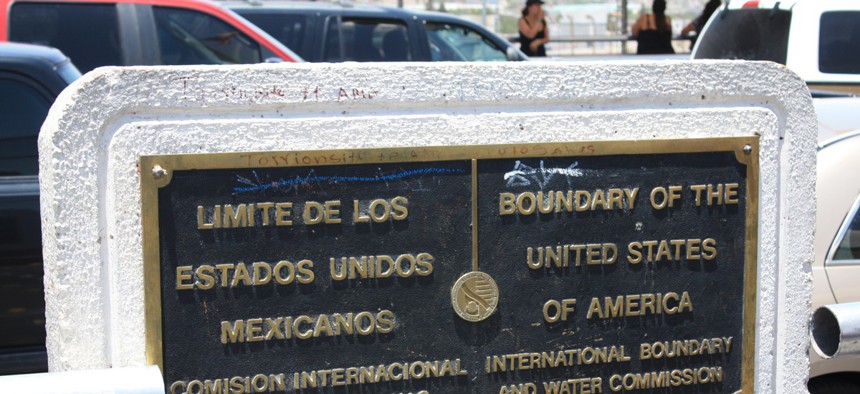
Flickr user afagenscazon
Boehner in Another GOP Quandary Over Border-Funding Request
House Republicans will meet Tuesday to begin forming a response to Obama's bid for $3.7 billion.
A familiar question that has marked much of this Congress is festering again over a legislative response to the border crisis: How much is Speaker John Boehner willing to sidestep a majority in his party in order to pass any or all of the emergency funding requested by President Obama?
On Tuesday morning, House Republicans will confer privately across the street from the Capitol in their regularly scheduled weekly meeting to discuss, among other topics, Obama's request for $3.7 billion to deal with the surge of unaccompanied minors to the U.S.-Mexico border.
There is a good chance a majority of GOP lawmakers will want to attach strings before approving Obama's request, and some could propose alternatives to his plan altogether. In either case, the question is whether Boehner will stick to a process that is compliant with the so-called Hastert Rule, the informal GOP practice that bars a vote on legislation unless it has the support of a majority of House Republicans. (It is named for former Speaker Dennis Hastert of Illinois.)
On Monday, the incoming House majority whip—Steve Scalise, who just weeks ago was leader of the 170 conservatives in the House Republican Study Committee—would not answer that question when it was posed to him twice.
Scalise offered only that House Republicans are now coming up with "our own plan." And he predicted "it's going to solve the problems," a reference to the crisis of thousands of children coming to the southern border.
Part of the House Republican meeting on Tuesday morning will be a briefing by the speaker's own "Border Working Group" that was set to arrive Monday night back in Washington from a trip to Central America.
House GOP leadership aides said the working group, led by Rep. Kay Granger of Texas, will not likely be ready to unveil specific legislative recommendations to deal with the crisis, and instead will mostly provide an update on what they saw and learned on the trip.
But among the changes that several GOP aides said will most likely be targeted in any Republican legislation taken up before lawmakers break for their August recess is a law that actually took effect in 2008 under former President Bush.
That bipartisan statute was intended to curb child trafficking, but some lawmakers on both sides of the political aisle are now blaming it for helping to exacerbate the current crisis.
In fact, Rep. Henry Cuellar, D-Texas, has been talking about legislation to alter that law. The idea would be to allow all immigrant children at the border to be voluntarily returned home to their families rather than held for deportation hearings, a swifter process already allowed for undocumented young immigrants from Mexico and Canada.
But opponents say that would undermine the purpose of the 2008 law—by sending people back to places where they probably won't be safe.
On Monday evening, Homeland Security Secretary Jeh Johnson met privately with House Blue Dog Democrats on that issue.
Meanwhile, senators from both parties are set to receive a private briefing on the same issue as well as on the president's overall funding request from Johnson; Health and Human Services Secretary Sylvia Mathews Burwell; acting Office of Management and Budget Director Brian Dees; and Deputy Attorney General James Cole.
In the House, the president's $3.7 billion request is officially under consideration by appropriators, though no hearings had been set as of Monday. Appropriations Chairman Harold Rogers, R-Ky., says his committee will take a thorough look at what is being proposed over the coming days and weeks. He also has said it is clear that additional funding is needed to take care of these children, to "enforce the law," and to "further secure the border."
Outside of Congress, some conservatives such as Heritage Action CEO Michael Needham have said they are eager to see changes in laws that are hampering the ability to deal with the surge. And in what could loom as a battle cry for some House Republicans, Needham has said the border-security issues should be addressed "through the regular appropriations process where priorities can be reordered and spending can occur within the established budget caps."
Publicly, at least, Boehner has already said some of the things conservatives want to hear. He has declared the House is not giving Obama "a blank check," and he has called this a crisis of the president's "own making." And on Monday, a House GOP leadership aide predicted Boehner will likely seek both to force the White House to "take a haircut" on the dollar amount—and to "take on border security provisions."
But will that be enough?
Boehner could once again find himself locked in trying to quench the often unquenchable demands of conservatives who don't want any more spending outside of the established appropriations process and budget caps.
And while doing so, he once again has to be measuring the potential alienation of House Democrats whose votes he might ultimately need to pass such a measure.
But House Rules Committee Chairman Pete Sessions, himself from Texas, predicted the Hastert Rule won't even come up in this process, saying House Republicans will unite behind an approach.
"That's the problem," responded Rep. Louise Slaughter, the top Democrat on the House Rules Committee. She said Republicans appear dead-set on devising a response to the president without any regard to House Democratic input—or whether their bill has any real chance of becoming law by passing the Democratic-led Senate.
"I'm not even sure many of them understand that's the process—it has to pass two houses to become law," Slaughter said.
But Boehner certainly understands that. The question is, how does he play this out?
(Image via Flickr user scazon)
NEXT STORY: The VA Scandal Just Keeps Spreading







